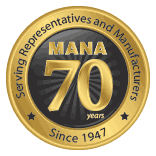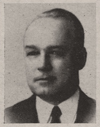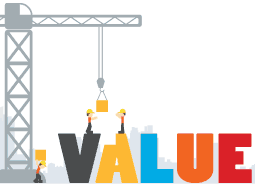 The year was 1947. Harry S. Truman was president, Chuck Yeager broke the sound barrier, and on October 17, 1947, the Manufacturers’ Agents National Association joined the community of not-for-profit trade associations.
The year was 1947. Harry S. Truman was president, Chuck Yeager broke the sound barrier, and on October 17, 1947, the Manufacturers’ Agents National Association joined the community of not-for-profit trade associations.
To celebrate our 70th MANAversary year, each Agency Sales magazine through October will include a “blast from the past” article from the early issues of The AGENT and Representative magazine, which eventually became Agency Sales.
These nostalgic looks back at how our counterparts from seven decades ago conducted their businesses and their lives are really eye-opening, in some cases because they conducted their business so differently from a modern manufacturers’ representative, and in some cases because it seems that nothing has changed in all that time. Enjoy!
Editorial Comment
By P. Edwin Thomas, Executive Secretary
(Reprinted from October 1949 The AGENT and Representative magazine)
SUGGESTIONS
The MANA Bulletin XI. which accompanied the September issue of this magazine to members, requested suggestions for future issues.
We are happy to say that the response was good, from all parts of the country, and definitely indicates to us that agents are not only aware of their magazine but also aware of the problems that agents face in the successful conduct of their business.
The many suggestions already received may be divided into several classes.
Consignment stocks loom large as a problem with many agents. State laws and regulations vary in all parts of the country, and it is difficult in advance to get full covering information from seats of government.
What constitutes intrastate commerce, as opposed to interstate commerce, is another problem with most manufacturers and consequently with their agents. This issue of our magazine has something on this subject by Mr. Thomas Connell, which will be followed by additional information in future issues. [Thomas Connell’s article was reprinted in the April 2017 “Blast From the Past.”]
City license fees continue to plague many agents. We recommend that the License Ordinance of your city be obtained by calling at the City Clerk’s Office, where firm name and address need not be given, and that such ordinance be studied carefully.
“Talking yourself into a depression,” comes in for considerable comment. Selling is a matter steeped in knowledge, confidence, hard work, and enthusiasm. Of these four, enthusiasm must spark the hard work, and how else can an agent have enthusiasm but by being confident of the possibilities for sales. Selling opportunities vary with the times, with individuals, with localities, with offerings — everybody knows that. But selling possibilities actually know no time, place, person, or product. To a good salesman, the world is his oyster, any time, any place. Read what Chas B. Roth has to say, each issue, in The Selling Parade. It’s worth more than a passing glance.
To many, it can be worth each issue all that it costs for annual membership in MANA. One suggestion picked up there can reasonably be responsible for additional business with resultant income to pay off many a selling expense.
Some have requested more articles on industries and their opportunities to agents. Others for technical articles on products and their uses. Still others for information on totally new products and their sources. These suggestions are pertinent to the work of agents, and we shall do what is possible within the limits of our present 24-page publication to satisfy the desires and needs of all concerned, without however duplicating the fields and facilities of trade publications already well established and easily and cheaply available to our members.
How principals can help agents in an over-all way to help themselves, is a suggestion coming from many points. A comprehensive discussion, by salesmen, as to how manufacturers may help agents’ salesmen in the field, is the suggestion of several. Thoughts pertinent to sales of different kinds of merchandise and products, by the heads or executives of member firms, is another suggestion.
QUESTIONS
What salaries and/or commissions should be paid agents’ salesmen? This is a question often asked. Of course it depends upon many things—location, product, territory, age, experience, volume. But the subject is undoubtedly worthy of attention, as we go along and accumulate data and reliable information.
What about members in different cities getting together? This, so far, has proved to be a moot question. First efforts to that end about a year ago in certain areas were not productive of substantial results. There seem to be many reasons for this. Many agents are on the road a great deal; cannot be available for lunches, dinners, and such. Many play the “lone- wolf” hand in the industry in which they work. Many are already members of rotary, booster, and other special types of clubs and have no desire for anything that will encroach further upon their limited time and energies.
Many prefer that the bulk of MANA work for the present be done behind the scenes, with the magazine as the official mouthpiece.
When will the A&R Annual Directory be out? When will the classifications of agents be elaborated to include all kinds and types? When will the new, ready-to-use “Standard Form of Agreement With Manufacturers’ Agent” be ready and what will they cost? Are members procuring and using the new Hotel Reservation request cards? Are my dues paid? Will you please change my address? When will the new Membership Cards be mailed to those who have already paid renewal dues and magazine? We want to change our firm name; is that all right? Enclosed is a copy of our contract with one of our principals that owes us long-overdue commissions; what do you think about it?
These are some of the questions that come to us in the mail daily. Many of them we can answer, and some of them we cannot. But a cross-section of your MANA activity should serve to convince almost anybody that agents need a National Association, and need it badly!
This need is not confined to small agents, as might be supposed. Definitely not! Some of the biggest and best agents in the United States look to their Association and rely upon it for assistance and advice in many matters of real importance. To them, MANA is a potentially vital force, and they are not only giving it their support but utilizing its services.
We know that the value and importance of MANA must be nurtured to full growth and wide influence, but it does seem certain that a wonderful start has already been made.



